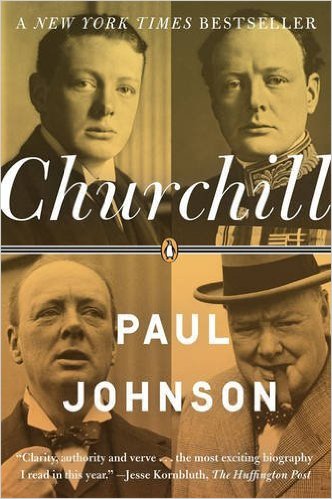Books |
Churchill
Paul Johnson
By
Published: May 15, 2022
Category:
Biography
A new meme equates Volodymyr Zelensky, president of Ukraine, with Winston Churchill. As wartime leaders, it’s apt. In every other way, it couldn’t be more inaccurate. Zelensky, a successful entertainer, became president at 41. Churchill, whose career was dotted with failures, didn’t ascend until he was 65. In 192 pages, this biography of Churchill is an excellent reminder that he was much more than a wartime leader. It’s an excellent introduction to Churchill for young readers. And the video is unforgettable.
“Of all the towering figures of the twentieth century, both good and evil, Winston Churchill was the most valuable to humanity, and also the most likable. It is a joy to write his life, and to read about it. None holds more lessons, especially for youth: How to use a difficult childhood. How to seize eagerly on all opportunities, physical, moral and intellectual. How to dare greatly, to reinforce success, and to put the inevitable failures behind you. And how, while pursuing vaulting ambition with energy and relish, to cultivate also friendship, generosity, compassion and decency.”
That’s the opening paragraph of Paul Johnson’s "Churchill," and if you appreciate clarity, authority and verve in historical writing, you will understand why I gulped down the next 190 pages.
I’ve studied Churchill; we all have. But the breadth of the man gets lost in a handful of anecdotes and film clips. Paul Johnson delivers the big picture and the tiny detail. So masterful is his approach, so sharp is his observation, so exacting his sense of detail that it’s not hard to agree with his assessment — Churchill saved the world as we know it.
And not Churchill the God, but Churchill the extremely interesting man. Johnson piles on the detail. Yes, Churchill drank whiskey or brandy all day — “heavily diluted with water or soda.” Yes, he stayed in bed as much as possible, for as he told Johnson (who interviewed him at the tender age of 17), the secret of life is “conservation of energy. Never stand up when you can sit down, and never sit down when you can lie down."
As a young politician, Churchill was asked what he stood for. “Opportunism, mostly,” he quipped. In fact, he was a liberal, and very progressive. Raised by a nanny, he helped her when her services were no longer needed, sat at her deathbed, kept her grave maintained. In 1910, he was a leader in the fight for old-age pensions. He saw the merits in prison reform: “The treatment of crime and criminals is one of the unfailing tests of the civilization of any country." He helped end the incarceration of children. He wrote 8 million words. He was under fire 50 times.
His personal life was unblemished. His mother had more affairs than she could count; after he married Clementine, “he never looked at another woman.” He painted so well that professionals couldn’t believe he was an amateur. He championed the creation of Israel. He drank Pol Roger champagne at meals and smoked a dozen cigars a day. He played polo until he was 53. He loved building walls of brick.
It’s a dizzying life. Eloquence, energy, ambition — this Churchill was a force of nature. It is Johnson’s great achievement in these pages that he also establishes Churchill as a colossal failure, who made serious mistakes and paid for them with long years in the wilderness. This only makes even more dramatic his ascendancy; at 65, with German bombers overhead, he finally became prime minister. "I was conscious of a profound sense of relief," he wrote later. "At last I had authority to give directions over the whole scene. I felt as if I were walking with destiny, and that all my past life had been but a preparation for this hour and for this trial…. I slept soundly and had no need for cheering dreams. Facts are better than dreams.” [To buy the paperback from Amazon, click here. For the Kindle edition, click here.]
The key fact: If Britain lost the war, it would lose its civilization. So the nation simply couldn’t lose. The war years are thus the most thrilling years of all, and we see how Churchill was everywhere. Giving great speeches that roused a people under siege. Working 16 hours a day and inspiring others to do the same. And strategizing all the time — manipulating Roosevelt, preparing for the battle of Germany, forcing Hitler to deal with Greece and postpone his invasion of Russia until the winter, with disastrous results for the Nazis.
The lessons to be learned couldn’t be clearer. Churchill was armed with facts, not ideology. He had the right priorities, and in the right order. He repeatedly interrupted his schedule for well-publicized acts of kindness. He was ruthless in pursuit of victory. He held no grudges.
If you have an evening reserved for thrills, here they are.
BONUS VIDEO
Churchill’s funeral. Don’t miss the cranes, at 2:30.


